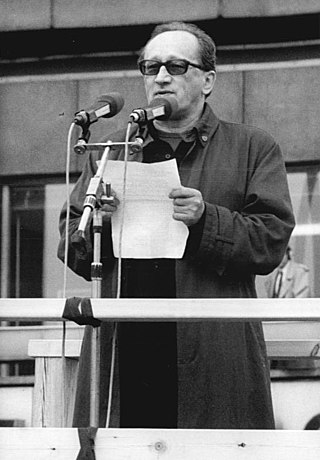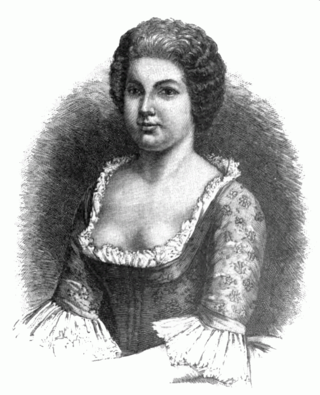Related Research Articles
Dramaturgy is the study of dramatic composition and the representation of the main elements of drama on the stage.

Stanisław Ignacy Witkiewicz, commonly known as Witkacy, was a Polish writer, painter, philosopher, theorist, playwright, novelist, and photographer active before World War I and during the interwar period.

Heiner Müller was a German dramatist, poet, writer, essayist and theatre director. His "enigmatic, fragmentary pieces" are a significant contribution to postmodern drama and postdramatic theatre.
Elizabeth LeCompte is an American director of experimental theater, dance, and media. A founding member of The Wooster Group, she has directed that ensemble since its emergence in the late 1970s.
Twentieth-century theatre describes a period of great change within the theatrical culture of the 20th century, mainly in Europe and North America. There was a widespread challenge to long-established rules surrounding theatrical representation; resulting in the development of many new forms of theatre, including modernism, expressionism, impressionism, political theatre and other forms of Experimental theatre, as well as the continuing development of already established theatrical forms like naturalism and realism.
Non-Aristotelian drama, or the 'epic form' of the drama, is a kind of play whose dramaturgical structure departs from the features of classical tragedy in favour of the features of the epic, as defined in each case by the ancient Greek philosopher Aristotle in his Poetics
The Decision, frequently translated as The Measures Taken, is a Lehrstück and agitprop cantata by the twentieth-century German dramatist Bertolt Brecht. Created in collaboration with composer Hanns Eisler and director Slatan Dudow, it consists of eight sections in prose and unrhymed, free verse, with six major songs. A note to the text by all three collaborators describes it as an "attempt to use a didactic piece to make familiar an attitude of positive intervention."
Josef Szeiler is an Austrian theatre director. As co-founder of the group Theater Angelus Novus he is first of all known for his experimental approach to texts by Heiner Müller, Bertolt Brecht, Homer and Greek dramas.

TDR: The Drama Review is an academic journal focusing on performances in their social, economic, aesthetic, and political contexts. The journal covers dance, theatre, music, performance art, visual art, popular entertainment, media, sports, rituals, and performance in politics and everyday life.

Frank Castorf is a German theater director and was the artistic director of the Volksbühne am Rosa-Luxemburg-Platz from 1992 to 2015. His work is often associated with postdramatic theatre.

Friederike Caroline Neuber, née Friederike Caroline Weissenborn, also known as Friedericke Karoline Neuber, Frederika Neuber, Karoline Neuber, Carolina Neuber, Frau Neuber, and Die Neuberin, was a German actress and theatre director. She is considered one of the most famous actresses and actor-managers in the history of the German theatre, "influential in the development of modern German theatre." Neuber also worked to improve the social and artistic status of German actors and actresses, emphasizing naturalistic technique. During a time when theatrical managers in Germany were predominantly men, Caroline Neuber stands out in history as a remarkably ambitious woman who, during her 25-year career, was able to alter theatrical history, elevating the status of German theatre alongside of Germany's most important male theatrical leaders at the time, such as "her actor-manager husband Johann, the popular stage fool Johann Müller, the major actor of the next generation Johann Schönemann, the multi-talented newcomer Gotthold Ephraim Lessing, and principally, their de facto Dramaturg, Johann Gottsched."
Goat Island was a collaborative performance group based in Chicago, Illinois and founded in 1987. They toured internationally and made nine performance works before disbanding. In 2006 they announced The Lastmaker (2007) would be the last work that they would create as a company, and the final performances were held at Swain Hall, University of North Carolina, Chapel Hill, in February 2009.
Hamletmachine is a postmodernist drama by German playwright and theatre director Heiner Müller, loosely based on Hamlet by William Shakespeare. It was written in 1977, and is related to a translation of Shakespeare's Hamlet that Müller undertook. Some critics claim the play problematizes the role of intellectuals during the era of Communism in East Germany; others argue that the play should be understood in relation to wider post-modern concepts. Hamletmachine is not centered on a conventional plot, but is partially unified through sequences of monologues in which the protagonist leaves his role and reflects on being an actor.
The Institute for Applied Theatre Studies is part of the Justus Liebig University Gießen. It offers three different degree programs: a three-year Bachelor's program, Applied Theatre Studies, and two two-year Master's programs, Applied Theatre Studies and Choreography and Performance (CuP). Each course places equal importance on academic and artistic practice. In seminars, reading courses and tutorials, students asked to engage with theoretical issues, while in performance projects, practical courses and workshops they experiment with different artistic approaches. Courses in the humanities and cultural studies offered by the university are also incorporated into each program. In choreography and performance, certain practical classes are organized in cooperation with the Frankfurt University of Music and Performing Arts, where these classes will also be held.
Back to Back Theatre is an Australian theater company that engages with disabilities on stage. The company is based in Geelong, Victoria. It creates its work nationally and tours around the world. The work produced by the company explores questions about politics, ethics, and philosophy in humanity.
Hans Hollmann was an Austrian-Swiss theatre director and actor. He also worked as a university lecturer and had a doctorate in jurisprudence. Despite having been born in Austria, for many years Hollmann lived with his family in Basel.
Sydney Front was an Australian performance group formed in 1986 particularly known for integrating the audience into their productions. They combining elements of performance art and experimental theatre in their work. In 1999 John McCallum, theatre critic in The Australian newspaper wrote,'The Sydney Front is still Australia's most influential contemporary performance company, although they disbanded in 1993.
Tzachi Zamir is an Israeli philosopher and literary critic specialising in the philosophy of literature, the philosophy of theatre, and animal ethics. He is Professor of English and General & Comparative Literature at the Hebrew University of Jerusalem.
Roslyn Oades is an Australian actress, puppeteer and theatre maker.
Elinor Fuchs was an American theater scholar, critic, and playwright.
References
- ↑ Lehmann (2006)
- ↑ Lehmann (2006) , p. 16
- ↑ Lehmann (2006) , p. 26
- ↑ Lehmann (2006) , p. 31
- ↑ Lehmann (2006) , p. 25
- ↑ Mason, Fran (12 December 2016). Historical Dictionary of Postmodernist Literature and Theater. Rowman & Littlefield. ISBN 9781442276208.
- ↑ "'Inspirational' unseen film of Tadeusz Kantor's last show before he died to be shown for first time". www.thefirstnews.com. Retrieved 2020-04-27.
- ↑ ""What to Read Now: Mixed-Genre Literature," Giannina Braschi on Heiner Müller, Tadeus Kantor, and Witkiewicz". World Literature Today. 2012-08-06. Retrieved 2020-04-27.
- ↑ Barnett, David (2006-08-21). "Political theatre in a shrinking world: René Pollesch's postdramatic practices on paper and on stage". Contemporary Theatre Review. 16 (1): 31–40. doi:10.1080/10486800500450957. S2CID 190863375.
- ↑ Battaglia, Andy (2020-04-09). "Robert Wilson Debuts Viewing Room for Mesmerizing Video Portraits, Featuring Lady Gaga's Severed Head and Other Oddities". ARTnews.com. Retrieved 2020-04-27.
- ↑ Parker-Starbuck, Jennifer (2009-01-01). "The play-within-the-film-within-the-play's the thing: re-transmitting analogue bodies in the Wooster Group's Hamlet". International Journal of Performance Arts and Digital Media. 5 (1): 23–34. doi:10.1386/padm.5.1.23_1. ISSN 1479-4713. S2CID 192213672.
- ↑ Jackson, Shannon (2013). "Postdramatic Labour in The Builders Association's Alladeen". Postdramatic Theatre and the Political: 165–188. doi:10.5040/9781408183519.ch-008. ISBN 9781408183519.
- ↑ Fierberg, Ruthie (11 September 2017). "13 Theatre Works That Responded to 9/11". Playbill. Retrieved 2020-04-27.
- ↑ cs2-admin (2016-02-17). "In memoriam: Pina Bausch, Beautiful and Tragic, Solemn and Classic". Critical Stages/Scènes critiques. Retrieved 2020-04-27.
{{cite web}}: CS1 maint: numeric names: authors list (link) - ↑ Jürs-Munby, Karen (2009-03-01). "The Resistant Text in Postdramatic Theatre: Performing Elfriede Jelinek's Sprachflächen". Performance Research. 14 (1): 46–56. doi:10.1080/13528160903113197. ISSN 1352-8165. S2CID 193228753.
- ↑ Kalb, Jonathan (2018). "Samuel Beckett, Heiner Müller and Postdramatic Theater". Samuel Beckett Today / Aujourd'hui. 11: 74–83. doi:10.1163/18757405-01101012. ISSN 0927-3131. JSTOR 25781357. S2CID 188421578.
- ↑ Haydon, Andrew (2008-11-11). "Andrew Haydon: Postdramatic theatre is no longer a closed book". The Guardian. ISSN 0261-3077 . Retrieved 2020-04-27.
- ↑ "Pan Pan". Pan Pan. Retrieved 2021-01-30.
- ↑ "OKTHEATER.ORG". www.oktheater.org. Retrieved 2021-01-30.
- ↑ "Susanne Kennedy - People - Volksbühne Berlin". volksbuehne.berlin. Retrieved 2021-01-30.
- ↑ Schmidt, Thomas (25 May 2017). "The Post-Dramatic Turn in German Theatre". HowlRound. Retrieved 2 January 2018.
- 1 2 Fuchs, Elinor (Summer 2008). "Postdramatic Theatre by Hans-Thies Lehmann and Karen Jürs-Munby (review)". TDR. 52 (2): 179.
- ↑ Fuchs, Elinor (Summer 2008). "Postdramatic Theatre by Hans-Thies Lehmann and Karen Jürs-Munby (review)". TDR. 52 (2): 179–180.
Bibliography
- Tuchmann, Kai (ed). Postdramatic Dramaturgies - Resonances between Asia and Europe. transcript Verlag, Bielefeld 2022. ISBN 978-3-8376-5997-9
- Boyle, Michael Shane, et al. Postdramatic Theatre and Form. Methuen Drama, 2019. ISBN 978-1-350-18330-8
- Sugiera, Malgorzata (2004). Beyond Drama: Writing for Postdramatic Theatre. Theatre Research International, 29 (1), pp. 6–28. doi:10.1017/S0307883303001226
- Lehmann, Hans-Thies (2006). Postdramatic Theatre. Translated and with an introduction by Karen Jürs-Munby. London and New York: Routledge. ISBN 978-0-415-26813-4.
- Fischer-Lichte, Erika; Wihstutz, Benjamin (2018). Transformative Aesthetics. Oxon and New York: Routledge. ISBN 978-1-138-05717-3.
- Jürs-Munby, Karen; Carroll, Jerome; Giles, Steve (2014). Postdramatic Theatre and the Political: International Perspectives on Contemporary Performance. Methuen Drama. ISBN 978-1408184868.
- Fuchs, Elinor (Summer 2008). "Postdramatic Theatre by Hans-Thies Lehmann and Karen Jürs-Munby (review)". TDR. 52 (2): 178–183. doi:10.1162/dram.2008.52.2.178. S2CID 193952790.